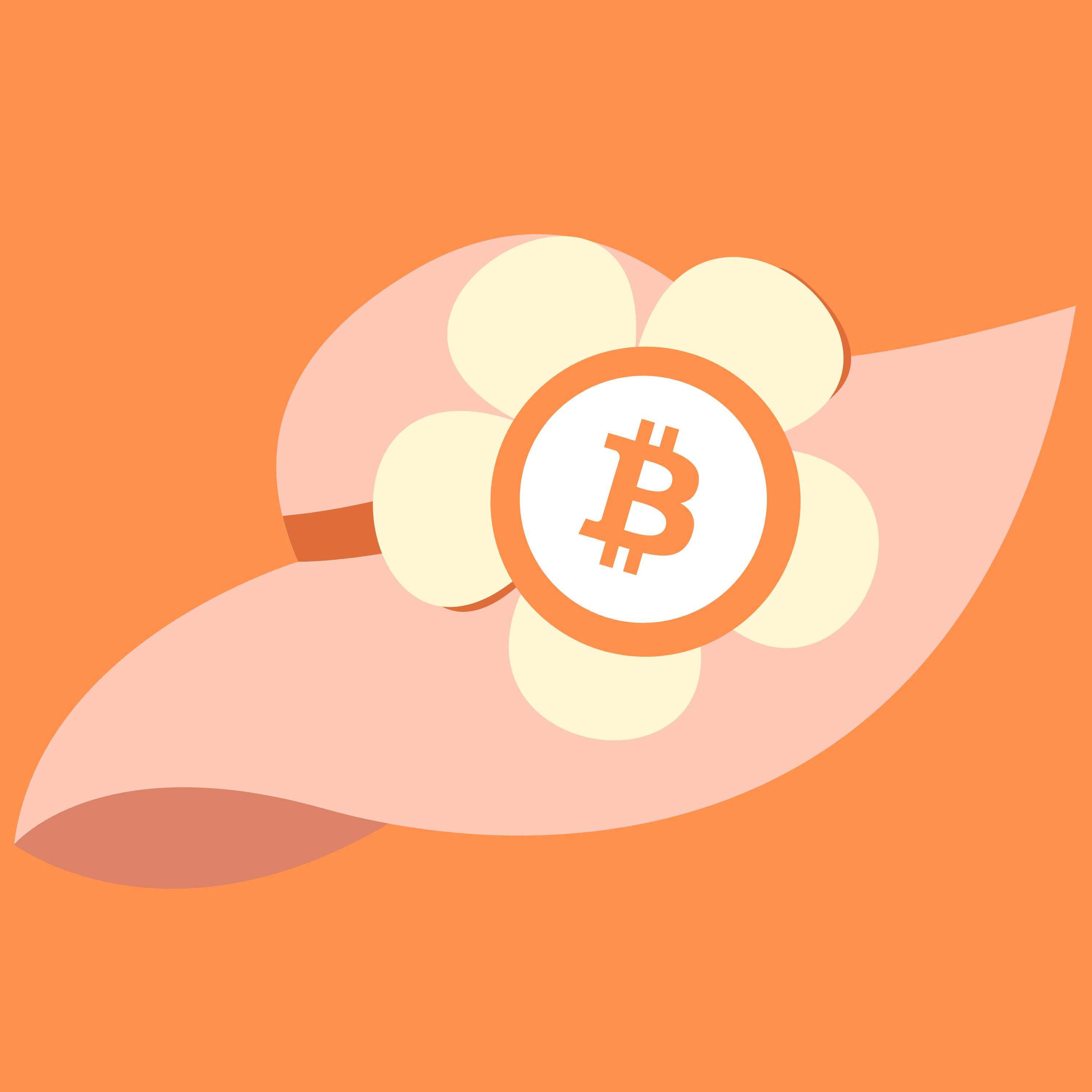Episode 38
A Tale of Two Americas: Marina's Bicultural Experiences and Exploration of Bitcoin - 1
In this episode, we delve into the rich and complex background of Marina, who has a unique blend of Mexican and American heritage, who grew up traversing the cultures of South America before returning to the U.S. for college. Marina’s story is not just a tale of two continents; it's a profound insight into understanding money, economics, and the revolutionary world of Bitcoin.
With her vast experiences across Mexico, Bolivia, Colombia, and her studies in international affairs and public policy at NYU, Marina offers an unparalleled perspective on Bitcoin's role in addressing global financial challenges. Learn about her journey from running a CEO network focused on Latin America to becoming a trailblazer in the Bitcoin space.
This episode explores Marina's belief in the potential of Bitcoin, and how her Latin American upbringing has shaped her understanding of finance, transparency, and innovation.
Marina's Contact Info:
Nostr-npub17069lhtwe279umwker069lcp33aqdgew70tn5q8cu2avml3sxpsqcu8hgu
Twitter-@MarinaSpindler
Don't miss out on the insightful dialogue! Subscribe and share with others who may benefit from Marina's story.
To learn more about Bitcoin: Join the Orange Hatter Women's Reading Club. Visit https://www.meetup.com/womensbitcoinreadingclubwithorangehatter
Please email questions/comments to Tali@orangehatter.com
Remember: Knowledge is empowerment! 🍊🎩
Mentioned in this episode:
Aleia Free Market Kids Sponsorship FULL
Get your HODL UP ("The best bitcoin game ever!") at www.freemarketkids.com.
Transcript
Hi everyone.
Tali:Welcome to Orange Hatter.
Tali:Today you'll be listening to a conversation I had with Marina.
Tali:Thank you so much, Marina, for joining us today.
Tali:I know you have tons of stories to share, so we're gonna jump right into it.
Tali:Before we jump into your Bitcoin story, please tell us a little bit
Tali:about yourself and your background.
Marina:Sure.
Marina:So I was born in the US, um, half Mexican, half American.
Marina:I lived in the US, uh, until I was five.
Marina:And then I grew up in South America, Mexico, Bolivia, Columbia, and
Marina:came back to the US for college.
Marina:So I, I'm American, but I grew up in Latin America, if that makes sense.
Marina:And that's a little bit of my background as far as cultural experience.
Marina:As far as understanding money, it really is the, that duality of everything
Marina:works versus nothing works sometimes.
Marina:And then in college I studied international affairs, and more recently
Marina:I did my master's in public policy at NYU.
Marina:So that's where my interest in the world and what's happening came about.
Tali:Yeah.
Tali:Thank you for that quick overview.
Tali:So let's jump into your Bitcoin story.
Tali:How did you first hear about it?
Tali:When was it, and what was your journey from discovery to conviction?
Marina:So it was back in 2014, I used to run a business association,
Marina:a very important CEO network that was focused on Latin America.
Marina:It was called The Group of 50.
Marina:And we would do yearly conferences in different places around the world.
Marina:So Singapore; Spain; Washington, D.C.; and that particular year
Marina:we went to Silicon Valley.
Marina:In Silicon Valley, you know, we had incredible people like Arianna
Marina:Huffington, ex-presidents, and, and among those, when we were developing
Marina:the agenda, we spoke with really, really important entrepreneurs from
Marina:Latin America who, one was from Argentina, they, they're from Venezuela.
Marina:They had sold their company to ... and they were now investing
Marina:in financial startups, if you will.
Marina:And they had come across Bitcoin because they had problems in
Marina:their countries sending money.
Marina:And so they were completely convinced that Bitcoin was the
Marina:next, the next money for the world.
Marina:And so they said, you have to do a panel about Bitcoin.
Marina:And they set up this amazing group of speakers for us.
Marina:And I mean, given how incredibly successful they are and their conviction
Marina:and the fact that they had seen the system from both sides, right, from the US and
Marina:from their countries, I knew that they were onto something, that, that this
Marina:was clearly important for the world.
Marina:But also at the same time, you know, I studied public policy,
Marina:I saw tech, I saw finance.
Marina:I was like, okay, really cool.
Marina:I'm gonna pay attention, but perhaps for me, not yet.
Marina:Right?
Marina:And this was 2014.
Marina:It was incredible.
Marina:I paid attention.
Marina:But I didn't go above just, you know, setting up that
Marina:panel, setting up that event.
Marina:But in 2017, I was working for an international consulting firm that,
Marina:you know, we're talking about new technologies and what we had to do,
Marina:and one of the speakers were explaining what was the revolution behind Bitcoin
Marina:and the blockchain and what that meant, and how it would change how
Marina:companies work, how the world worked.
Marina:And in that occasion, we touched upon immutability, transparency, why
Marina:the ledger was so important, how it had created a completely different
Marina:change for how money used to work and how it was gonna work in the future.
Marina:And then because I studied public policy, as I say, I go, wow.
Marina:Like, that's when my head went boom, like the emoji, right?
Marina:You know, transparency, immutability, all the things that we talk about from...
Marina:when we're trying to change things in the world, there it was.
Marina:And so that's when I said, okay, this is what I wanna do in my life.
Marina:This is where I wanna focus.
Marina:This is what I want to dedicate my time to.
Marina:And that's when I started going to conferences and messing up
Marina:royally, because you go to like Bitcoin this, Bitcoin that.
Marina:And then there's some really weird sketchy people trying to sell you
Marina:stuff, instead of really, like, explaining what's behind it, what
Marina:it means, how it's changing things.
Marina:But you know, in the end, if you are persistent, you find the right groups,
Marina:you find the right people who, like, make sense and they're not shilling something.
Marina:And, you know, that's how I started being, uh, I got hired by a, by
Marina:a company in Columbia that was using Bitcoin to send money to
Marina:different places around the world.
Marina:There was an OTC.
Marina:And that's how I started that journey.
Marina:They were having problems explaining to people what was ... value, and obviously
Marina:Bitcoin at the time had that terrible sense of, like, only criminals use it.
Marina:And so what we were focusing on obviously was, okay, how does it solve your problem?
Marina:We save you 20% because you don't have to pay the fees of changing your money from
Marina:Colombian pesos to, let's say the Euro.
Marina:Because it usually goes from the, the pesos to the dollar to the Euro.
Marina:And that takes, you know, three weeks or so.
Marina:And so they were saving 20%.
Marina:They were sending the money within two days.
Marina:And the goal with that team was, like, that's what you should tell your clients.
Marina:That was, you should explain to them.
Marina:And once they, you pique their interest, then you can say, okay,
Marina:we're doing this via Bitcoin.
Marina:So it really was about storytelling and about explaining how we're
Marina:solving a really big problem for you and your company.
Marina:Right?
Marina:So that's how we started, that's how I started in this space.
Tali:So can we go back and, for the people who are listening out
Tali:there who don't know anything about Bitcoin, you mentioned immutability
Tali:and other aspects of Bitcoin.
Tali:Would you mind going a little bit more into detail about what those terms
Tali:mean and why they're so important?
Marina:So one thing that I liked as far as the explanation of why money is
Marina:different with Bitcoin, right, was...
Marina:and or why it became different was because before, let's say
Marina:you send a picture, right?
Marina:And the picture is in your computer and also on somebody else's computer.
Marina:So there is the copy of that picture.
Marina:And so what the blockchain allowed because it's now in the system and then
Marina:there's a new ledger each 10 minutes...
Marina:every 10 minutes, there's a new system that tracks what's
Marina:happening in different computers...
Marina:now that, that, that proof that you sent the money or that you sent
Marina:the Bitcoin is in the ledger, and it is no longer on your computer.
Marina:It is now part of the ledger, and it's been passed to another person.
Marina:So the for the first time in, in the history, you were able
Marina:to send money without keeping a copy of that money, right?
Marina:And that's what made it completely different from before.
Marina:That was the innovation, and again, transparency, because it's on the
Marina:blockchain, it is on the system, and nobody can change it, because obviously
Marina:every 10 minutes it's updated, and it's in many, many, many computers
Marina:and many, many, many, many nodes.
Marina:So if somebody tries to fudge with it, it's very obvious
Marina:that something's happened.
Marina:So those were the two, the two innovations that I thought were brilliant and
Marina:that made Bitcoin such an obvious solution for global money, if you will.
Tali:Yeah, uh, definitely.
Tali:And also, you mentioned that when you are sending fiat currency and doing
Tali:the exchange from the Colombian Peso to the Euro that there is a 20% fee.
Tali:Can you explain why Bitcoin is better?
Tali:Why Bitcoin doesn't have that 20% fee?
Marina:Well, I mean, there's fees, right?
Marina:And it depends on how much is happening on the blockchain...
Marina:but it's not even just the fees.
Marina:Think about, Tali, like how many...
Marina:I mean, right now in, in my home, I'm, I'm in Mexico right now, and in my
hometown, my address is:next to the basketball court, next to the block of
hometown, my address is:this, and in the house of this corner...
hometown, my address is:and that's your house, like, there's no actual address.
hometown, my address is:And so if you want to do KYC when you're sending money abroad, which is
hometown, my address is:typical, a, a lot of people are left out of the system, because they don't
hometown, my address is:have a real quote unquote "address".
hometown, my address is:And, and that limits a lot of what happens.
hometown, my address is:And so, yes, it's fast...
hometown, my address is:i, I also think it's faster, right?
hometown, my address is:I have a...
hometown, my address is:a colleague and I, we did a, we did a project for a company, a Bitcoin
hometown, my address is:company in El, in, in Argentina.
hometown, my address is:And they said, well, do you want Bitcoin or do you want fiat?
hometown, my address is:I said Bitcoin.
hometown, my address is:My colleague said fiat.
hometown, my address is:He his took two weeks to get there.
hometown, my address is:Mine took five minutes.
hometown, my address is:And, you know, three months later, because of where we were in the money...
hometown, my address is:in, in the up and down cycles, my, my payments almost doubled.
hometown, my address is:And he's like, damn, I should have accepted the Bitcoin.
hometown, my address is:And obviously that's not what happens all the time.
hometown, my address is:Bitcoin goes up and down.
hometown, my address is:You really do have to have a long-term horizon when deciding to accept
hometown, my address is:Bitcoin, unless you, you know, if you have that ability, which I did at the
hometown, my address is:time, it made complete sense, because I could think long term about it.
hometown, my address is:Not everybody has that possibility.
hometown, my address is:So I understand that that things can get complicated, but in my case, it
hometown, my address is:made total sense, and I was happy...
hometown, my address is:because also, if you are a Bitcoiner and you are not accepting Bitcoin,
hometown, my address is:it really doesn't make sense.
hometown, my address is:Right?
hometown, my address is:You have to walk the talk and, and, and do it yourself as well, right?
Tali:Yeah, for sure.
Tali:And that...
Tali:you were referencing people who don't have physical addresses.
Tali:There are also people who are just unbanked based on their lack of credit...
Tali:depending on which system, economic system you're in.
Tali:And they have a lot of trouble making very basic transactions that
Tali:we kind of just take for granted.
Tali:Like, sure, I can, you know, write a, write a check or, yeah.
Tali:But also you're talking about the timing and how much faster
Tali:it is because it's, it's...
Tali:you go into a general ledger, and it's over the internet, and there's no third
Tali:party in between, as you mentioned.
Tali:You, you don't, there's no bank, there's no exchange that you're going through.
Tali:You're going person to person, it's peer to peer.
Tali:Thanks for joining us today and learning with us today.
Tali:If the discussion with our guest resonated with you, and you would
Tali:like to dive deeper into the world of Bitcoin, don't miss out on joining the
Tali:Orange Hatter Women's Reading Club.
Tali:The meetup link is in the show notes.
Tali:Also, if there are women in your life whom you think will both enjoy and
Tali:benefit from learning more about Bitcoin, please share Orange Hatter with them.


